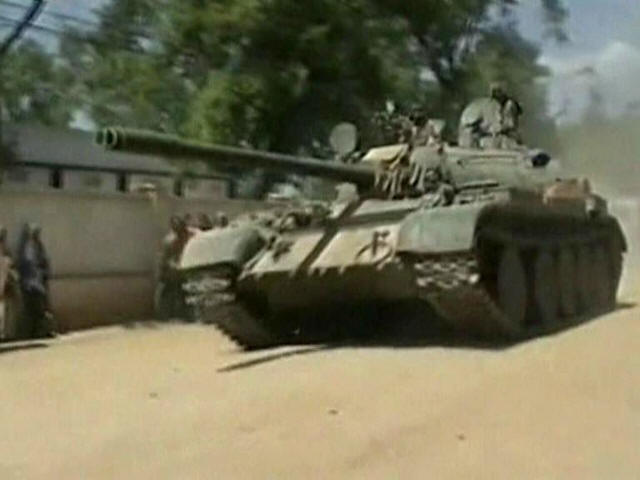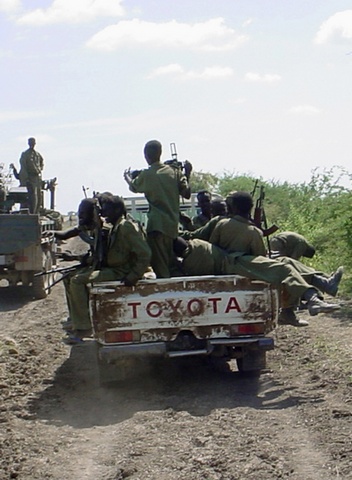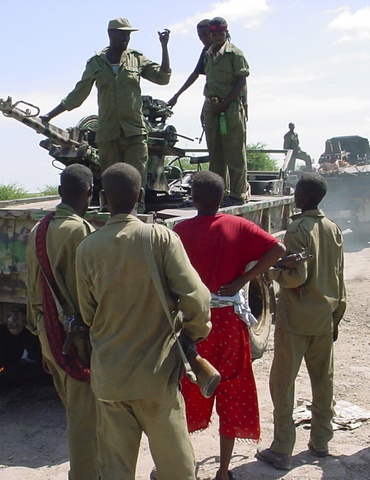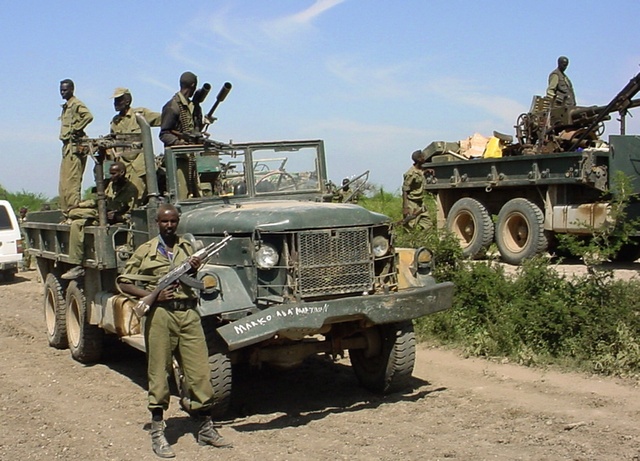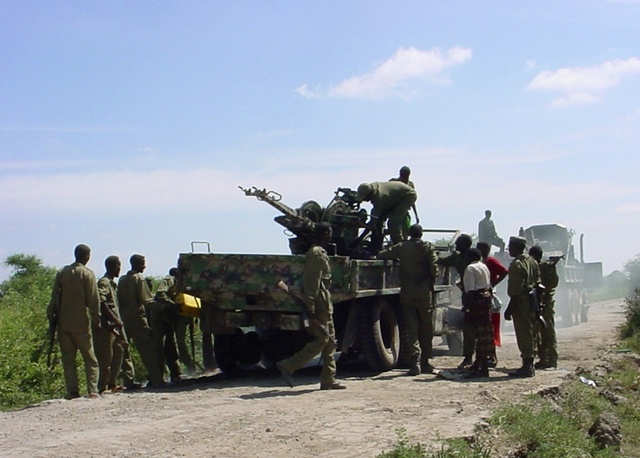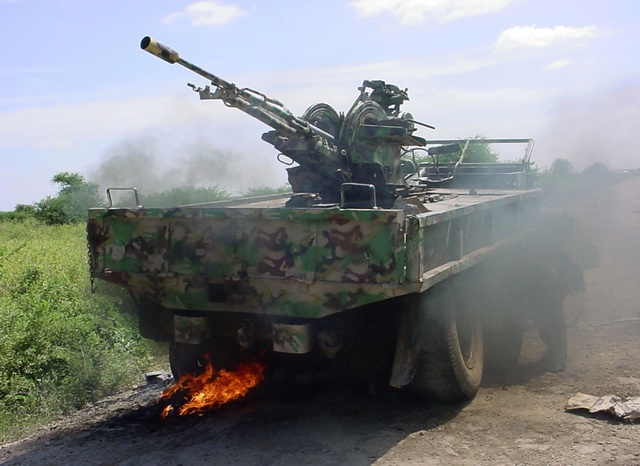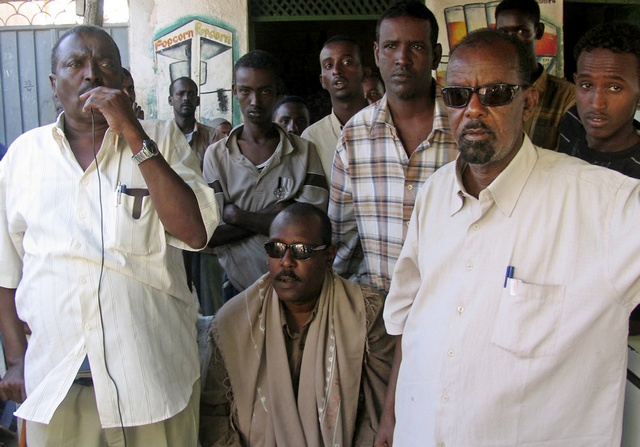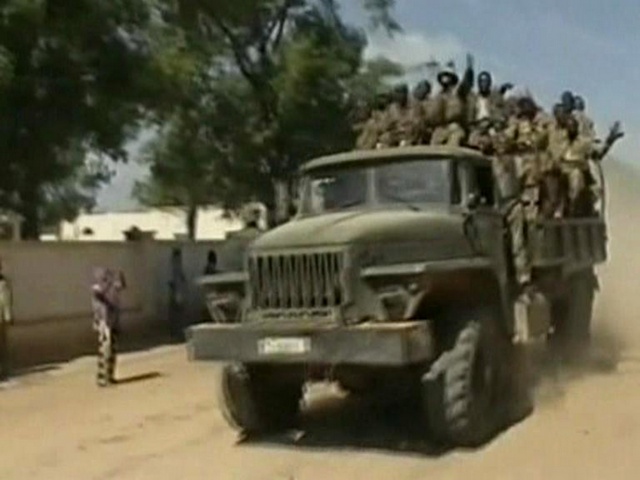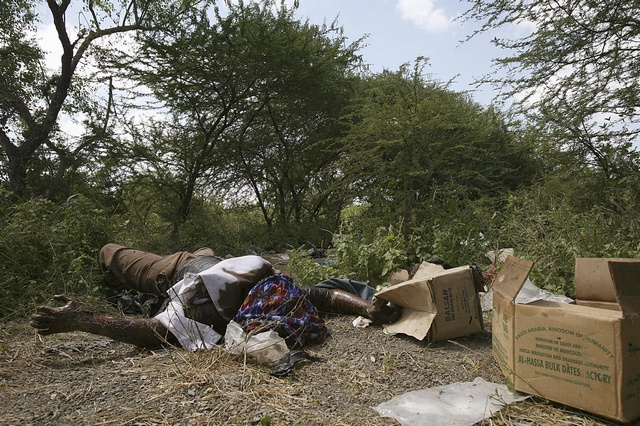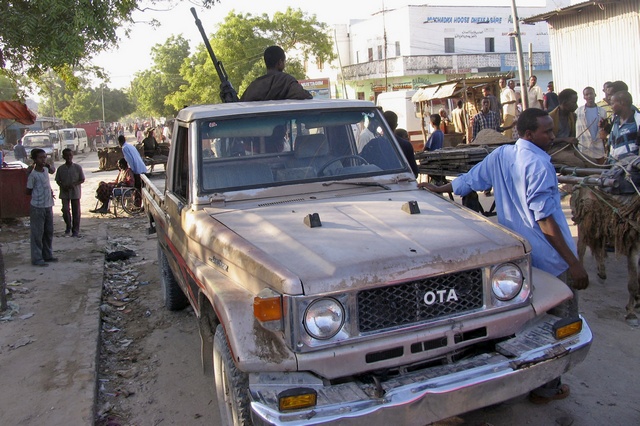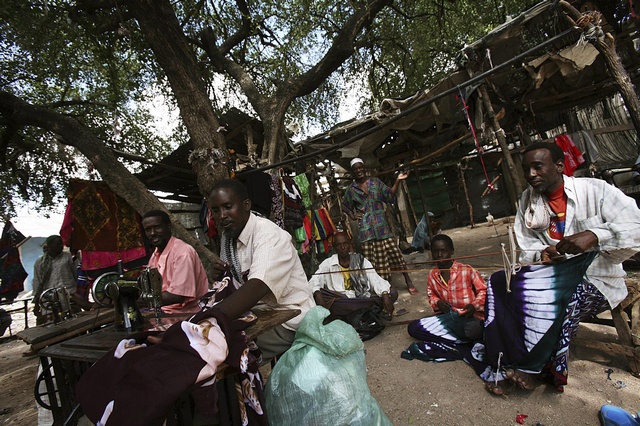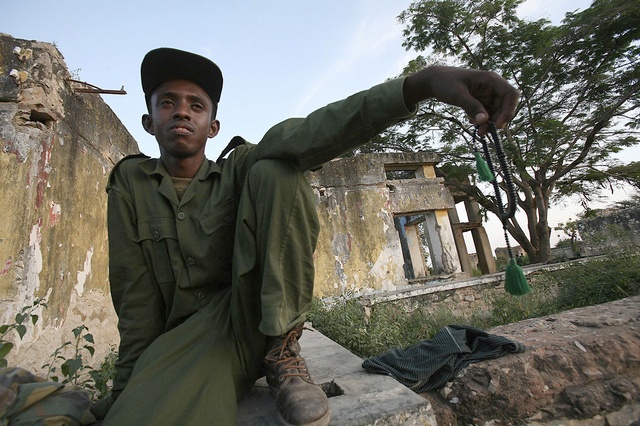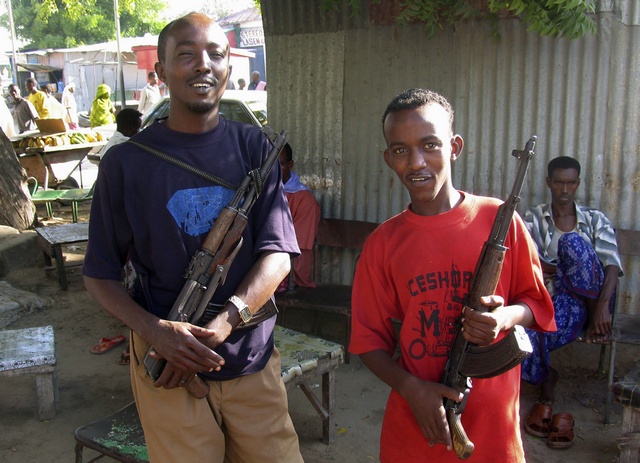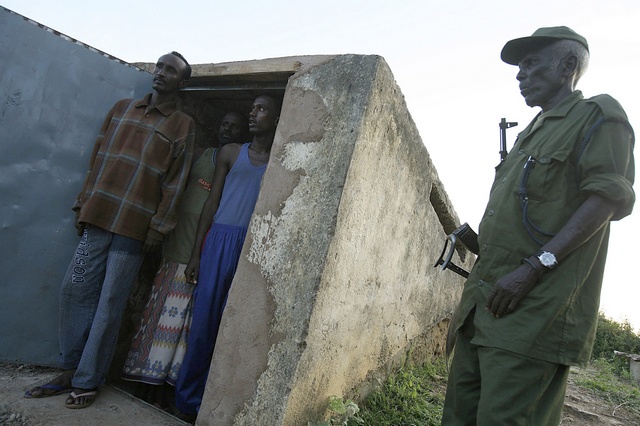|
Mogadishu Subdued? |
|
M O G A D I S H U S U B D U E D?
Soldiers loyal to the Somali government ride on military vehicles near the town of Jowhar December 27, 2006. A joint force of Ethiopian and Somali government troops advanced to just 30 km (18 miles) from Islamist-held Mogadishu on Wednesday. QUALITY FROM SOURCE REUTERS/Stringer (SOMALIA)
Soldiers loyal to the Somali government ride on military vehicles near the southern Somali town of Jowhar December 27, 2006. A joint force of Ethiopian and Somali government troops advanced to just 30 km (18 miles) from Islamist-held Mogadishu on Wednesday,. QUALITY FROM SOURCE REUTERS/Stringer (SOMALIA)
A military vehicle damaged in battle burns on the road near the Somali town of Jowhar December 27, 2006. A joint force of Ethiopian and Somali government troops advanced to just 30 km (18 miles) from Islamist-held Mogadishu on Wednesday,. REUTERS/Stringer (SOMALIA)
Sheik Ali Digir (L), a Somali tribal elder, addresses residents after Islamists Courts Council fled Mogadishu December 28, 2006. Triumphant Somali government forces marched into Mogadishu on Thursday after Islamist rivals abandoned the war-scarred city they have held for six months in the face of an Ethiopian-backed advance. REUTERS/Shabelle Media (SOMALIA)
Ethiopia-backed forces enter Mogadishu: residents
December 28, 2006
AFGOYE, Somalia, Dec 28, 2006 (AFP) - Ethiopian-backed Somali government troops Thursday entered northern Mogadishu hours after Islamists abandoned the city they had controlled for six months, the country's premier and residents said.
"We are already inside Mogadishu in some areas," Prime Minister Ali Mohamed Gedi told reporters in Afgoye township, about 20 kilometres (13 miles) west of the capital.
Deputy Prime Minister Mohamed Hussein Aidid said the developments marked a historic day in the lawless African nation, home to 10 million people.
"We (the soldiers) are already in Mogadishu and tomorrow, we (the government) will enter Mogadishu," he added, indicating that government officials planned to go to the capital on Friday.
"Today is a historic day for Somalia. It is a day of reconciliation and victory (and) a day of the return of law and order. This victory is Somali people's victory. We are here to bring peace," Aidid said.
Earlier, the government declared a state of emergency across the nation and said its priority would be to restore law and order in Mogadishu and to disarm civilians across the nation.
Mogadishu residents in the Suuqaholaha district confirmed the troops had entered into the city from the north, where one said that crowds cheered the government forces he saw accompanied by Ethiopian soldiers.
"I saw government troops in north Mogadishu. They have fully entered the town. People were cheering and shouting that 'Welcome our government'," said Nur Dirie, another resident.
"I am telling you that I also saw Ethiopian forces enter, (they) are now in Suuqaholaha. They are eating bananas and mangoes and I saw them do that," Dirie added.
"They have come, the Ethiopian troops!" exclaimed Saney Mumin, a resident said.
"I counted 50 Ethiopian armed vehicles. They are now at Masnah military camp (in northern Mogadishu)," he added.
"I have seen some government troops who are uniformed enter parts of Suuqaholaha and El-Arsid neighbourhood," said Aweys Ibrahim, a resident of northern Mogadishu.
"I never saw Ethiopians, but only government."
Mogadishu residents said the government forces had approached the city from the north, northwest and west, effectively surrounding the capital by the land approaches.
In Afgoye, Gedi held talks with elders and other local leaders, amid fears that the Islamists were planning to launch a guerrilla war, an AFP correspondent accompanying him reported.
Gedi, who travelled on an Ethiopian helicopter, said he had no plans to meet Islamic Courts Union officials.
Gedi arrived in this township accompanied by Aidid and police comissioner Ali Madobe, both former warlords who were routed from Mogadishu by the Islamists in June.
Fighters backing the government took control of the international airport, the sea port and the presidential palace once Islamists had conducted a "tactical withdrawal" after Ethiopian troops and aircraft began attacking them on December 20.
Relief workers said the Islamist leadership told them that their gunmen had been forced to split up into clan-based militia similar to those run by the warlords who held Mogadishu until they were routed in June, when the Islamic Courts Union's power spread over the south and centre of the country.
Somali Gov't Troops Roll Into Mogadishu
By SALAD DUHUL 28 December 2006
MOGADISHU, Somalia (AP) - Somali government troops backed by Ethiopian forces rolled into Mogadishu without firing a shot Thursday, a striking gain in its bid to recapture the country from an Islamic movement that had once seemed nearly invincible.
Hours earlier, the Islamic militants fled Mogadishu, pledging to make a last stand in southern Somalia.
"We are in Mogadishu," Prime Minister Mohamed Ali Gedi said after flying from the government's temporary base in western Somalia and meeting with local clan leaders to discuss the handover of the city. "We are coordinating our forces to take control of Mogadishu."
The Islamic movement took control of Mogadishu six months ago and then advanced across most of southern Somalia, often without fighting. Ethiopian troops then went on the attack in support of the U.N.-backed government last week in attempt to push the Islamists out of power.
In the Gulf of Aden on Wednesday, two boats filled with Somalis and Ethiopians capsized after Yemeni patrol boats chased one of them and fired on two other vessels. At least 17 people drowned and 140 were missing, the U.N. refugee agency said Thursday. Yemeni authorities were searching for survivors, the agency said.
The confrontation took place when four boats smuggling 515 people were spotted by Yemeni authorities, the U.N. said. The two boats that were fired on had just offloaded passengers in Yemen and only smugglers were on board, the UNHCR said. The smugglers returned fire, according to Yemeni officials, and the two other boats capsized while trying to escape in the darkness, officials said.
Many of the Somalis said they were fleeing the fighting; others on board may have been poor migrants seeking better economic conditions, officials said.
Experts had feared the conflict could engulf the already volatile Horn of Africa. A recent U.N. report said 10 countries have been illegally supplying arms and equipment to both sides of the conflict and using Somalia as a proxy battlefield.
The conflict has also drawn concern in the United States, which accused the Islamists of harboring al-Qaida terrorists. An insurgent group linked to al-Qaida in Iraq urged Muslims on Thursday to support the Islamists in Somalia "financially, with weapons and men and with prayers."
The prime minister was welcomed to the town of Afgoye on the outskirts of Mogadishu by dozens of clan leaders from the capital and hundreds of government and Ethiopian troops. The clan leaders pledged to the help collect weapons from the remaining militiamen in the capital, government spokesman Abdirahman Dinari told The Associated Press.
The Islamists' retreat early Thursday, which its leaders called tactical, was followed by looting by clan militiamen, some of whom had been their allies. It was a chilling reminder of the chaos that had once ruled Mogadishu after warlords overthrew longtime dictator Mohamed Siad Barre in 1991, leaving the country without a central government.
Gunfire could be heard in many parts of the city, and witnesses said several people had been killed.
Before the Islamists established control, Mogadishu had been ruled for the last 15 years by competing clans who came together to support the Islamic movement. The interim government that was established two years ago with the help of the U.N. had been unable to assert its authority in the city, in part because it was weakened by clan rivalries.
Somalia's complex clan system has been the basis of politics and identity here for centuries. Many fear they may now revert to fighting one another and reject the government's authority.
In Ethiopia, Prime Minister Meles Zenawi vowed to inflict total defeat on the Islamic movement and said he hoped the fighting would be over "in days, if not in a few weeks."
"We are discussing what we need to do to make sure Mogadishu does not descend into chaos. We will not let Mogadishu burn," he told reporters in Ethiopia's capital, Addis Ababa.
President Abdullahi Yusuf tried to allay fears of rampant violence in the capital, saying his troops were not a threat to the people of Mogadishu. "The government is committed to solving every problem that may face Somalia through dialogue and peaceful ways," the statement said.
In the south, meanwhile, the Islamic militants vowed to continue their fight against the government and Ethiopian forces, saying they had fled Mogadishu to spare civilian deaths.
"We want to face our enemy and their stooges ... away from civilians," Abdirahman Janaqow, a top leader in the Islamic movement, said in a telephone interview.
The Red Cross said hospitals and other medical facilities in southern and central Somalia have admitted more than 800 people over the past few days.
Yusuf Ibrahim, a former Islamic movement fighter, said only the most hardcore fighters were still opposing the government and its Ethiopian backers. He said they numbered about 3,000 and were headed to the port city of Kismayo, south of Mogadishu, which the Islamists captured in September.
Witnesses reported seeing a large number of foreign fighters in the convoys heading south. Islamic movement leaders had called on foreign Muslims to join their "holy war" against Ethiopia, which has a majority Christian population. Hundreds were believed to have answered the call.
Residents told the AP that Islamic leader Hassan Dahir Aweys had arrived in the frontline town of Jilib, 65 miles north of Kismayo, earlier Thursday with hundreds of fighters aboard 45 pickup trucks mounted with anti-aircraft guns.
Islamic fighters have gone door to door in Kismayo recruiting children as young as 12 to make a last stand on behalf of the Islamic movement, according to a U.N. report citing the families of boys taken to Jilib.
Associated Press writers Mohamed Olad Hassan in Mogadishu, Les Neuhaus in Afgoye, Somalia, and Chris Tomlinson in Nairobi, Kenya, contributed to this report.
© 2006. The Associated Press. All Rights Reserved.
Road to Mogadishu tells story of swift Somali victory
By C. Bryson Hull December 28, 2006
MOODE MOODE, Somalia, Dec 28 (Reuters) - The bloated corpses of Islamist fighters and an unbroken line of tank tracks along the Baidoa-Mogadishu highway tell the story of a swift advance for the Somali government and its Ethiopian allies.
For at least 80 km (50 miles) east of the government's base Baidoa, spent shells from heavy guns litter the road along which the battle for control for the Horn of Africa nation has played out over the last 10 days.
At least two dozen bodies of Islamist fighters, swollen by the sun, lie in the thorny bush of Moode Moode, the closest the Islamists reached to the government seat before being thrashed back by combined Somali-Ethiopian military might.
Some 50 km (30 miles) east of Baidoa, residents of Buur Hakaba said the gunmen of the Somalia Islamic Courts Council (SICC) had left the town far faster than they arrived.
"We thought they would be fighting back and equipping themselves, but they were busy changing clothes," said 40-year-old local Deros Mohammed Ibrahim.
At one filthy camp where two SICC fighters were gunned down, empty water bottles, food wrappers and half-eaten bread lay scattered on the ground.
There was also a box of dates marked "Gift from the Government of Saudi Arabia", perhaps lending credence to a United Nations commission report accusing at least 10 foreign nations of fuelling the battle for the anarchic nation.
ABUSE AND HARRASSMENT
The Ethiopian presence, long denied, is no longer a secret. Ethiopian trucks full of relaxed looking soldiers ply the highway, a few with black grease over their number plates in an apparent attempt to hide one of the most overt of covert wars.
At Baidoa airport, where dozens of wounded Ethiopian troops were flown out in transport planes, five Ethiopian Mi-24 attack helicopters sat idle on the runway, their task accomplished.
Just east of Buur Hakaba, about three dozen Ethiopian soldiers sat at a makeshift camp just off the highway as their commanding general gave orders for the advance into Mogadishu.
The Islamists had controlled Buur Hakaba for more then two months and massed troops there for their assault on Baidoa.
But residents -- who complained the SICC had drastically cut the highway commerce the town survives on and imposed a brand of Islam too harsh for local customs -- said its fighters had been quick to swap their fatigues for civilian clothes.
Many said they were happy to see the back of them.
"I am very glad. I did not expect them to lose so swiftly and I thank Allah for their failure," said one local.
Another resident, 56-year-old Sheikh Ali Hassan, agreed.
"They have been here 65 days and I have never seen such abuse and harassment," he told Reuters.
"We have been Muslims for thousands of years. We have not been missing religion, we have been missing a government."
© 2006 Reuters Limited
Islamists Seem to Give Up Grip on Somali City
By JEFFREY GETTLEMAN December 28, 2006
NAIROBI, Kenya, Dec. 27 — The Islamist forces who have controlled much of Somalia in recent months suddenly vanished from the streets of the capital, Mogadishu, residents said Wednesday night, just as thousands of rival troops massed 15 miles away.
In the past few days, Ethiopian-backed forces, with tacit approval from the United States, have unleashed tanks, helicopter gunships and jet fighters on the Islamists, decimating their military and paving the way for the internationally recognized transitional government of Somalia to assert control.
Even so, the Islamists, who have been regarded as a regional menace by Ethiopia and the United States, had repeatedly vowed to fight to the death for their religion and their land, making their disappearance that much more unexpected.
Fortified checkpoints across the city — in front of the radio station, at the airport, at the main roads leading into Mogadishu and outside police stations — were abruptly abandoned Wednesday night, residents said.
Many of the teenage troops who made up the backbone of the Islamist army had blended back into the civilian population, walking around without guns or their trademark green skullcaps.
The sudden reversal left it unclear whether a war that had threatened to consume the Horn of Africa had quickly ended, or the Islamists had merely gone underground, preparing to wage a guerrilla insurgency, as some leaders had threatened.
“The whole city is just waiting,” said Sheik Ahmed Shiro, a Koranic teacher in Mogadishu.
At 10 p.m. on Wednesday, several Islamist leaders emerged to hold a news conference at their headquarters in Mogadishu. They did not explicitly concede defeat to the transitional government, but seemed to be preparing their forces for such an eventuality. “We need our soldiers to return to their positions for the sake of the people,” said Sheik Sharif Sheik Ahmed, one of the leaders. “Even if your positions are transferred to the government, you must stay where you are and make sure Mogadishu is as safe as it was before.”
As he spoke, Mogadishu was rapidly descending back into the clan-based anarchy that had been its hallmark for most of the past 15 years, before the Islamists came to power and pacified the city.
Witnesses said bands of armed thugs swept through the markets, smashing and stealing at will. Gunfire rattled from neighborhood to neighborhood as the disparate clan-based militias that had joined forces to form the Islamist movement began to fragment and turn on one another.
With the war going badly for them, clan elders had been rapidly losing faith in the Islamist leaders, residents said. The quick defeat the Islamists suffered earlier on Wednesday at Jowhar, the last major town on the road to Mogadishu, seemed to be the final straw.
The Islamists started out as a grass-roots movement of clan elders and religious leaders who banded together earlier this year to rid Mogadishu of its notorious warlords, earning them a lot of public support.
But much of that good will seems to have been sapped by their decision to go to war against the transitional government and the Ethiopian forces protecting it.
The Islamists attacked Baidoa, the seat of the transitional government, on Dec. 20; a few days later, they announced that Somalia was open to Muslim fighters around the world who wanted to wage a holy war against Christian-led Ethiopia.
That provoked a crushing counter-attack by the Ethiopians, who command the strongest military in East Africa. For the past week, the Islamists have lost one battle after another, their adolescent soldiers no match for a professional army.
By Wednesday, the Islamists were cornered. Thousands of troops from the transitional government were closing in on the seaside capital from two directions.
Mogadishu was coming unhinged. The ports and airports had closed, leading to a shortage of just about everything, sending prices for food, medicine and fuel skyward. A gallon of gas in Mogadishu now costs $8.
The once feared Shebab, the devout young Islamic fighters, began deserting in droves. (Shebab is the Arabic word for youth.) “We can’t resist,” said Musa Abdullahi, an 18-year-old Shebab who quit his unit after half his comrades were cut down by Ethiopian helicopter gunships. “We thought this fighting would be like the others. It’s not.”
Ahmed Nur Bilal, a retired Somali general, said the war had been a horrible miscalculation.
One of the first things the Islamists did after the fighting started was to close all schools in Mogadishu in order to send more young people to the front. “They’ve misled our children to their deaths,” Mr. Bilal said.
Residents said that crowds in one slum threw rocks at the Islamists’ pickup trucks as they drove by on Wednesday. Some people openly celebrated in the streets by hoisting up pictures of the transitional government’s leaders and gleefully chewing khat, a mildly narcotic plant the Islamists had outlawed.
The demonstrations helped prompt the clan elders, who are regarded as the pillars of Somali society, to act. According to residents in Mogadishu, the leaders of several major clans — and some businesspeople who had been financing the Islamists — demanded that the Islamist leaders return the armed pickup trucks that had been lent to the movement.
Faced with the loss of support from their counterparts, other clan leaders saw the coalition begin to crumble and withdrew their trucks as well, leaving little of the organized force that once lent the Islamists their power.
One adviser to Western diplomats who has close contacts with both the Islamists and the transitional government described the unraveling as an “organic process that rose up from the people, in an unorganized way, Somali style.”
Disappointment in the Islamists, however, does not necessarily translate into widespread enthusiasm for the transitional government, which until last week had been considered weak and divided by many Somalis. Thousands of people in Mogadishu, a war-weary city of two million, have begun to pack up and leave, residents said, afraid not only of the possibility of heavy urban fighting but also of a return to warlord rule, which kept Mogadishu in anarchy for years.
The transitional government has sent mixed signals about what it plans to do next.
Until now, Mogadishu had been considered too dangerous as a headquarters for the transitional leaders, themselves a mix of clan elders and former warlords. But transitional government leaders have always said they eventually planned to base their government in the capital, and this week they vowed to keep fighting until Mogadishu was theirs.
Several Mogadishu residents said on Wednesday night that they expected the Ethiopian-backed forces to march into the city at dawn. That has been a pattern since the fighting began, with the Islamists retreating from cities across Somalia during the night and the transitional government troops arriving in the morning. But some analysts believe there will be a few days of negotiations before that happens.
Ethiopian officials have said that occupying Mogadishu is not part of their plan. But they have also said that rooting out Islamist extremists is their priority.
Mohammed Ibrahim and Yuusuf Maxamuud contributed reporting from Mogadishu.
Government troops ride in a truck as they move into the southern Somali town of Jowhar in this video grab taken December 27, 2006. A joint force of Ethiopian and Somali government troops advanced to just 30 km (18 miles) from Islamist-held Mogadishu on Wednesday. REUTERS/Reuters TV (SOMALIA)
An Islamic Courts militiaman lies dead in Bur Haqaba, 60km (37 miles) south of Baidoa in Somalia December 28, 2006. Triumphant Somali government forces and their Ethiopian allies marched into Mogadishu on Thursday after Islamist rivals abandoned the war-scarred city they held for six months. The flight of the Islamists was a dramatic turn-around in the volatile Horn of Africa nation after they took Mogadishu in June and spread across the south imposing sharia rule. REUTERS/Guy Calaf/Pool (SOMALIA)
Somalians stand next to a pick-up truck which the Islamists Courts Council surrendered in Mogadishu December 28, 2006. Triumphant Somali government forces marched into Mogadishu on Thursday after Islamist rivals abandoned the war-scarred city they have held for six months in the face of an Ethiopian-backed advance. REUTERS/Shabelle Media (SOMALIA)
Somalis work in Bur Haqaba, 60km (37 miles) south of Baidoa in Somalia December 28, 2006. Triumphant Somali government forces and their Ethiopian allies marched into Mogadishu on Thursday after Islamist rivals abandoned the war-scarred city they held for six months. The flight of the Islamists was a dramatic turn-around in the volatile Horn of Africa nation after they took Mogadishu in June and spread across the south imposing sharia rule. REUTERS/Guy Calaf/Pool (SOMALIA)
A Transitional Federal Government soldier rests while holding prayer beads in Baidoa, Somalia, December 27, 2006. REUTERS/Guy Calaf/Pool (SOMALIA)
Somali militiamen hold weapons they looted after Islamists Courts Council fled Mogadishu December 28, 2006. Triumphant Somali government forces marched into Mogadishu on Thursday after Islamist rivals abandoned the war-scarred city they have held for six months in the face of an Ethiopian-backed advance. REUTERS/Shabelle Media (SOMALIA)
A Transitional Federal Government soldier (R) guards captive Islamic Courts soldiers in Baidoa, Somalia, December 27, 2006. REUTERS/Guy Calaf/Pool (SOMALIA) (TFG17)
|
